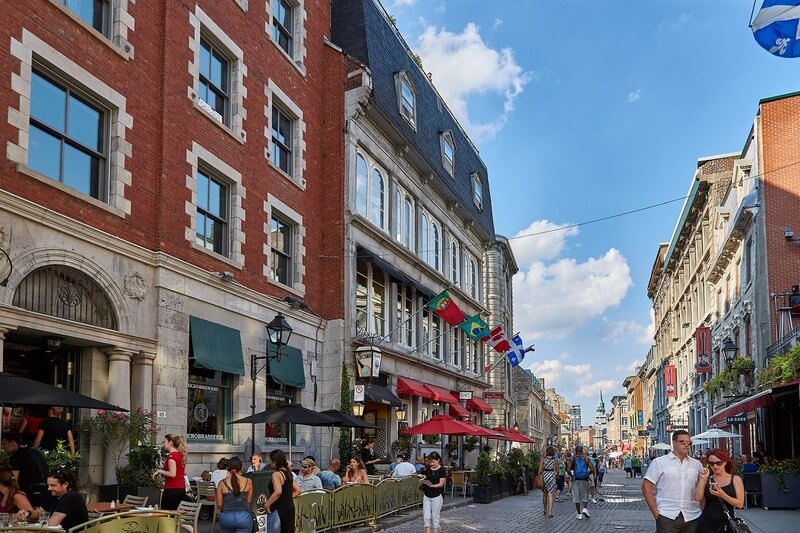
With its historic architecture and rich cultural life, Montreal is a great destination for travellers who want to immerse themselves in Canada’s history. The nation’s second-largest city is also an important hub for business travel. But whether you’re visiting on vacation, for work, to study or for another reason, you need to know what type of authorization you need to enter the country. You might require a visa to travel to Canada. Alternatively, you might be able to travel using a travel document called an electronic travel authorization, or eTA. Finally, you might need neither. Which type of travel document you need depends on your home country as well as a number of other factors.
Who qualifies for an eTA?
You can apply for an eTA to visit Montreal if you meet a few requirements. First, you need to be a national of a visa-exempt country. There are over 50 nations on the list of visa-exempt countries, so check whether yours is one of them. If you’re a national of one of these visa-exempt countries, you can apply for an eTA if you’re going to be entering Canada by air. If you’re coming by land or sea, you don’t need one.
Travellers from visa-exempt countries aren’t the only people who can apply for an eTA to enter the country. Visitors from some nations that would generally require a visa can apply for an eTA if they are going to enter Canada by air. If you’re from Brazil, Bulgaria or Romania and have either held a Canadian visitor visa in the last ten years or currently hold a non-immigrant visa for the United States, you may be able to enter the country with an eTA. However, if you’re travelling by land or sea, you must apply for a visitor visa.
Whether you’re from a visa-exempt country or a Bulgarian, Romanian or Brazilian national, you’ll also need a valid passport, an email address and a credit card to pay your application fee.
If you’re applying for another kind of travel document, such as a student or work permit, you will typically receive your eTA as part of the application process.
Applying for an eTA
Once you’ve determined whether you qualify, you can apply for an eTA. The online application process typically takes no more than a few minutes, and most applications result in a reply in three days or less. However, delays are possible, if rare, so you should always arrange for your eTA.
Who needs a visitor visa?
If you’re not from one of the countries that would qualify you to apply for an eTA, you’ll need to apply for a visitor visa for your trip to Montreal. The application process for a visitor visa varies depending on the reason for your visit and other factors, but you’ll need to provide information demonstrating the reason for your journey and your ability to support yourself while in Canada.
In addition to providing supporting documentation as part of the visa application, you’ll also need to provide biometric information in the form of fingerprints and a photograph. To satisfy the application requirement, you must make an appointment to have both taken at an authorized biometric collection site. Once you’ve completed your application, you must wait to see if it is approved. If it is, you’ll be asked to submit your passport to have the visa added to it. Once your passport and visa are returned, you’re ready to travel. Sometimes, you may need to bring additional documents on your journey. For example, if a child under 18 accompanies you on your trip, you may need additional documentation to prove that the child has permission to travel. When your application is approved, IRCC will notify you about what additional documentation, if any, you need to provide.
Travelling without either a visitor visa or an eTA
Most visitors to Canada enter the country without either a visitor’s visa or an eTA because they enter the country from its southern neighbour, the United States. US nationals entering Canada don’t need a visa or an eTA, although US permanent residents must bring proof of their status. And naturally, you won’t need an eTA or a visa for your trip to Montreal if you’re a Canadian citizen or permanent resident. However, you will need your Canadian passport or permanent resident card.
Visa and eTA duration
When planning your trip to Montreal, you must know how long you can stay in the country. Both eTAs and visas can vary in the length of time they permit you to stay in Canada, with visas being more variable; you’ll find out exactly how long your particular visa allows you to stay during your application. The duration of an eTA can vary, but typically it will allow you to enter Canada for up to six months at a time. The eTA itself lasts longer, meaning that you can use the same authorization to visit Canada multiple times. It expires after five years or when the passport it’s associated with expires, whichever comes first.
As with any authorization to enter Canada, both a visa and an eTA can be modified in rare cases by a border services officer if circumstances demand it. These modifications are unusual, however, and the vast majority will last their full length.
Preparing for your visit to Montreal
Whether you need a visitor visa or an eTA for your trip to Montreal depends on your nationality and the circumstances of the trip. Once you know what you need, you can begin your application; once the application is complete, you can travel to Canada confidently.